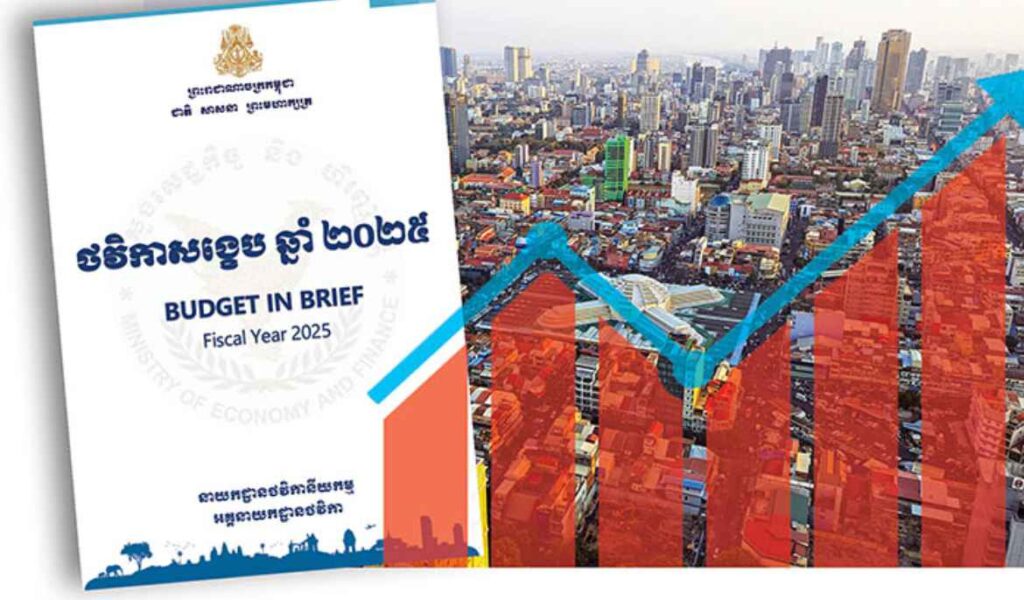Cambodia’s economy is projected to grow at 6.3 percent in 2025, said the Budget in Brief report for the Fiscal Year 2025, released by Ministry of Economy and Finance (MEF) on Tuesday.
According to the assessment of the Royal Government’s medium-term public financial framework, the growth is expected to increase the current price of Gross Domestic Product (GDP) to around 209,163 billion riels, equivalent to approximately $51.39 billion, the report said. Meanwhile, the GDP per capita is anticipated to reach $2,924.
According to the forecast, Cambodia’s economic growth in 2025 will mainly be supported by key sectors such as industry, services, and agriculture.
The report stated that the industrial sector is projected to continue growing at around 8.6 percent in 2025, supported by a balance between the garment and non-garment sub-sectors, while the construction sub-sector is expected to grow at a slower pace compared to pre-Covid-19 levels.
The services sector is projected to grow by 5.6 percent in 2025, driven by continued growth in the hospitality, food, and other support services sub-sectors, while the real estate sub-sector is expected to continue growing at a slower pace, the report said.
The agricultural sector is projected to grow by 1.1 percent in 2025, driven by strong growth expectations in the crop and livestock sub-sectors and the gradual recovery of the fisheries sub-sector, it added.
The report also stated that the average annual inflation rate is projected to be around 2.5 percent by 2025, driven by sustained domestic economic activity and the normalization of both the domestic situation and international commodity prices. Total international reserves are expected to remain at $24.42 billion by 2025, sufficient to cover imports for 7.5 months.
Speaking to Khmer Times, economist Duch Darin stated that economic diplomacy has helped contribute to the growth of the economy, along with the three key sectors—industry, services, and agriculture—which mainly drive economic growth.
He noted that Cambodia’s projected gross domestic product (GDP) growth is driven by the robust performance of services and goods exports, highlighting the success of these diplomatic efforts.
By diversifying export markets and strengthening trade relationships, economic diplomacy has contributed to expanding export markets, Darin said. Additionally, partnerships forged through diplomacy have unlocked funding for infrastructure development, reduced export costs, and boosted competitiveness in global markets.
“In a nutshell, economic diplomacy has supportively contributed to accelerating GDP growth by boosting exports and recovering the services sector, attracting more Foreign Direct Investment (FDI) to fuel industrial expansion and diversify the economy, and reviving tourism as a cornerstone of economic recovery.
“These efforts not only strengthen Cambodia’s economic resilience today but also lay a robust foundation for sustainable development, ensuring that the benefits reach all Cambodians,” Darin said.
Aun Pornmoniroth, Deputy Prime Minister and Minister of MEF, recently said that in 2025 the economy is projected to grow around 6.3 percent, mainly supported by a continued momentum in export-oriented sectors, especially the garment sectors.
“Accommodation and other supporting sectors (Tourism) are expected to continue an upward trend and move toward the pre-pandemic level.
“Meanwhile, resilient momentum in non-garment will maintain with newly emerging production industries, especially automotive assembly, food, and beverage productions,” he said.
Inflation in 2025 is expected to be at the rate of 2.5 percent, according to Pornmoniroth.
However, the World Bank forecasted that Cambodia’s Gross Domestic Product (GDP) growth is projected to marginally improve, reaching 5.5 percent in both 2025 and 2026.
This forecast was made in the World Bank’s ‘Cambodia Economic Update: From Recovery to Resilience – Harnessing Tourism and Trade as Drivers of Growth,’ which was released last December.
Cambodia can further boost its growth by diversifying trade and improving productivity, said Tania Meyer, the World Bank Country Manager for Cambodia.
“Investing in human capital, particularly education, and deepening reforms to improve the business environment will be key to enabling the private sector to create more and better jobs,” she said.



